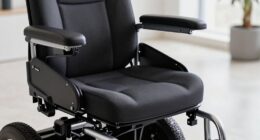Jack Nicholson’s situation emphasizes the importance of distinguishing between truth and myth when it comes to dementia. Reports of cognitive decline and memory loss are common, particularly given his age of 85. It is crucial to identify early indicators, such as social isolation and impaired judgment, in order to mitigate risks. Recognizing that age and family history play a significant role in the likelihood of developing dementia can empower individuals to take a proactive approach. Progress in research also provides optimism for early detection using biomarkers. By monitoring changes in behavior, you can facilitate timely conversations with healthcare professionals. Interested in learning how to effectively recognize these signs? There is more to discover.
Key Takeaways
- Cognitive decline is not solely caused by aging; lifestyle and health management can significantly influence dementia risk and progression.
- Early symptoms like social withdrawal and memory loss are often mistaken for normal aging, emphasizing the need for vigilance and awareness.
- Dementia is not an inevitable outcome of aging; genetic and environmental factors play crucial roles in individual risk levels.
- Advances in research and biomarkers are reshaping our understanding of dementia, allowing for earlier detection and intervention strategies.
- Regular monitoring of behavioral changes can facilitate timely discussions with healthcare providers, leading to improved care and outcomes.
Nicholson Rumors and Reality

Nicholson Rumors and Reality
Rumors about Jack Nicholson's cognitive health have surfaced, stirring concern among friends and fans alike. You might've noticed that he's been less visible in social settings and has withdrawn from acting projects. Many friends and family members have expressed worries, pointing out that Nicholson seems to be showing signs of memory loss.
This increased social isolation, combined with his age of 85—placing him in a high-risk category for dementia—raises alarms. Individuals in this age group often face complex emotional and psychological challenges, which can sometimes resemble symptoms of conditions like Borderline Personality Disorder (BPD).
Nicholson's selective engagement with family, particularly his son Ray, suggests he's still maintaining some connections, but it also highlights a troubling trend of withdrawal. His behaviors can be interpreted as avoidance of reality, which may indicate deeper issues. Friends have noted that his limited social interactions could be symptomatic of cognitive decline, given the common signs associated with dementia.
While it's important to acknowledge these concerns, it's equally vital to separate fact from speculation. Understanding the complexities of cognitive health, especially in high-risk individuals like Nicholson, requires careful observation.
The conversation surrounding his health should focus on compassion and support, rather than jumping to conclusions.
Recognizing Dementia Symptoms

Recognizing dementia symptoms early can make a significant difference in managing the condition effectively. Common signs to watch for include social withdrawal and memory loss, which Jack Nicholson has reportedly shown. If you notice a loved one becoming more isolated or forgetting recent conversations, it's crucial to pay attention. Early signs of dementia can also manifest as confusion with time or difficulty completing familiar tasks, such as managing finances or following a recipe. Addressing these symptoms promptly allows for earlier medical intervention and the development of a care plan tailored to the individual’s needs. If untreated, the condition may progress more rapidly, making it essential to recognize and act on these early indicators.
Additionally, individuals experiencing cognitive decline may also face challenges similar to those seen in cold medications when it comes to maintaining focus and clarity.
Another key warning sign is difficulty in judgment and reasoning. This might manifest as getting lost in familiar places, which can be alarming. Additionally, forgetting names of family members or familiar objects is typical in dementia cases, as seen in Nicholson's situation.
You should also look out for attention and communication issues. If someone struggles to follow conversations or frequently loses track of topics, it could indicate cognitive decline.
Family members and caregivers need to remain vigilant for these signs. The earlier you recognize these symptoms, the sooner you can initiate discussions with medical professionals.
Early intervention not only helps in managing symptoms but can also improve the quality of life for those affected. By being proactive, you can guarantee that your loved one receives the support they need.
Understanding Risk Factors

Understanding the risk factors for dementia is vital in taking proactive steps towards management and prevention. Knowing what increases your risk can help you make informed choices about your health. Here are three key factors to evaluate:
1. Age: The most significant risk factor for dementia is age. Once you reach 65, your chances of developing dementia increase greatly, with individuals like Jack Nicholson exemplifying this trend at 85 years old.
Additionally, just as early detection is fundamental for conditions like breast cancer, understanding your age-related risks can lead to earlier interventions for dementia as well early detection importance.
2. Family History: If dementia runs in your family, your risk may be higher. Genetic or environmental influences can play a considerable role in the likelihood of developing this condition, so it's important to be aware of your family's health history.
3. Health Conditions: Certain medical conditions, such as cardiovascular issues and Down Syndrome, are linked to a higher risk of dementia later in life.
Managing these health issues can be an important part of your preventive strategy.
Advances in Research

As you consider the risk factors associated with dementia, it's equally important to stay informed about the latest research advancements that aim to improve diagnosis and treatment. Ongoing studies focus on Alzheimer's disease (AD) and utilize biomarkers to detect the disease before symptoms arise. A 2023 study published in *Brain* identified significant plasma biomarkers, such as amyloid-beta peptides and neurofibrillary tau tangles, vital for tracing early AD pathologies.
These findings reveal that elevated levels of plasma P-tau181, NfL, and GFAP concentrations can signal abnormalities linked to Alzheimer's. This means you could potentially intervene earlier, enhancing the quality of life for those affected. The CDC emphasizes that early diagnosis and awareness of dementia symptoms can lead to better outcomes.
Here's a quick look at some recent biomarker advancements:
| Biomarker | Significance |
|---|---|
| Amyloid-beta peptides | Indicates early AD pathology |
| Neurofibrillary tau tangles | Essential for tracking disease progression |
| Plasma P-tau181 | Detects abnormalities for early intervention |
Advancements in biomarker research are paving the way for more effective screening tools, promising to revolutionize dementia diagnosis and treatment in the near future.
Importance of Monitoring Changes
Monitoring changes in behavior and cognition is essential when it comes to dementia. As a close contact of someone showing signs, you play a significant role in documenting any shifts. This information can be invaluable for medical professionals when diagnosing dementia.
The CDC highlights key warning signs like memory loss, social withdrawal, and difficulties in judgment. Additionally, understanding common dementia medications for the elderly can provide further context when discussing symptoms and treatment options. By keeping an eye on these changes, you can help facilitate early intervention.
Here are three important steps to take:
- Observe Regularly: Pay attention to daily behaviors, noting any significant changes. For example, is your loved one forgetting names or getting lost in familiar places?
- Document Findings: Keep a record of observed changes over time. This documentation will aid discussions with healthcare providers, making it easier to convey concerns.
- Engage in Conversations: Don't hesitate to discuss your observations with clinicians. Early identification of symptoms can lead to better management and care options.
Being vigilant not only aids in early detection but also fosters informed conversations about cognitive health and potential interventions. Your proactive approach can make a significant difference.
Frequently Asked Questions
What Is Believed to Be the Cause of Dementia?
Dementia's caused by a mix of factors. Age, genetics, and certain medical conditions play significant roles. Lifestyle choices, brain injuries, and ethnic background also contribute, underscoring the complexity of this cognitive decline.
What Famous Person Was Diagnosed With Dementia?
Did you know that nearly 6 million Americans live with Alzheimer's? A famous person diagnosed with dementia is Glen Campbell, the country music legend, who publicly battled the disease, raising awareness about its impact on individuals and families.
What Is the Psychology Behind Dementia?
The psychology behind dementia involves cognitive decline affecting emotions and social connections. You might see increased anxiety and stress in both patients and caregivers. Early detection and supportive environments can greatly improve psychological outcomes for everyone involved.
Conclusion
In unraveling the myths surrounding dementia, you'll find that awareness is your greatest ally. Jack Nicholson's case reminds us that speculation often clouds the truth. By recognizing symptoms, understanding risk factors, and keeping an eye on changes, you can help dispel the fog of misinformation. As research advances, so does hope. Staying informed isn't just a shield; it's a beacon guiding you through the murky waters of dementia's complexities. Don't let shadows define your understanding.









